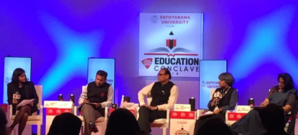
Education Conclave 2016 organized by India Today in association with Sathyabama University.
The recently concluded Education Conclave 2016 witnessed a decent line up of eminent speakers from the academia, across the nation and ‘generated more light than heat’, as defined by a delegate. And rightly so. Senior Fellow, Centre for Policy Research, Ms. Kiran Bhatty left the delegates of the packed house unsettled when she mentioned that the Government has no clue as to what number of children today in the country do not attend school. Within the Government there are varied figures provided by different departments. While MHRD data reflect 3 million kids, Ministry of Statistics says 20 million and as per the Census data, it is a whopping 40 million children.

The tone of the conclave was set right earlier by Raj Chengappa, India Today Group Editorial Director, during his welcome address when he mentioned that out of 3,500 colleges and 700 Universities in the country only 140 odd has been accredited by National Assessment Accreditation Council (NAAC) and out of which only 32% managed to get a A+ rating. The facts clearly illustrate the government’s objective to drive the right to education being implemented as a fundamental right,is yet to gain momentum.
Anita Rampal, former Dean at Faculty of Education in Delhi University, spoke about the dichotomy which exists between skills and knowledge. In the wake of government’s initiatives towards imparting vocational training and impactful skills India campaign somewhere the importance of basic knowledge and primary education should not take a back seat. Basic education should be available to every child irrespective of their social or economic background and the onus definitely lies with the state and the education system in public sector.
The vision statement should include both education and skill development programs. Skilling alone cannot replace education. While skilling can make one eligible for a particular job, with education he can probably even do better.
Brainstorming sessionswere held on ‘Classroom without borders, emergence of virtual universities’ and ‘New centers of excellence with focus on research and collaborations’. Prof. Rupamanjari Ghosh, VC, Shiv Nadar University and Rajendra Pandey, President, NIIT University touched upon the importance of an atmosphere which encouragestransformational research work, filing of patents and innovative IPRs. Industries should be invited to collaborate, partner or sponsor such research work where output gets monitored and regulations should discourage silos from getting created.India need to move forward from the present situation where education institutes today is over regulated and under governed.
Prof. GopaSabharwal, VC, Nalanda University, stressed on the fact that unlike age old traditional universities where every subject from Arts to Zoology is taught, it is time we have more and more highly specialized and focused universities on the subject.
Vineet Gupta, Co-Founder, Ashoka University stating the fact that while India is one of the a major player in the education paradigm of the world with largest education infrastructure voiced concern over the fact that how only 2 Indian universities finds place in the top 200 universities of the world.
 In her key note speech by Mariazeena Johnson, MD, Sathyabama University, Chennai emphasize don how universities today need to take a holistic approach when it comes to the overall growth of the student. Physical education can no longer be termed as extra-curricular activity. It is a mainstream activity should be clubbed with academics. Insisting on the importance of research she said, in a university, prominence should be on research rather than on teaching. Online repository that maps research skills and expertise should be created and made available for seamless collaborations.
In her key note speech by Mariazeena Johnson, MD, Sathyabama University, Chennai emphasize don how universities today need to take a holistic approach when it comes to the overall growth of the student. Physical education can no longer be termed as extra-curricular activity. It is a mainstream activity should be clubbed with academics. Insisting on the importance of research she said, in a university, prominence should be on research rather than on teaching. Online repository that maps research skills and expertise should be created and made available for seamless collaborations.
Commendable work at theBarefoot College International, situated in Tilonia, Rajasthan, 115 KM away from Jaipur, providing basic services and solutions to problems in rural communities, with the objective of making them self-sufficient and sustainable in areas like Solar Electrification, Clean Water, Education, Livelihood Development, was shared by Meagan Fallore.
Also present were C. Raj Kumar, VC, OP Jindal Global University; Gary Tubb, Faculty Director, University of Chicago Centre, Delhi; Nicholas Booker, Executive Director, Passport to India; Kavita Sharma, President South Asian University; Deepak Phatak Professor IIT Bombay; Kabir Chaddha, Country Head Coursera; Padmini Ray Murray, Faculty Digital Humanities, Srishti Institute of Art, Design and Technology.
The government’s viewpoint was shared by Reena Ray Additional Secretary MHRD who represented Union Minister for HRD, Smriti Irani who could not make it; and Rajiv Pratap Rudy, MoS, Skill Development and Entrepreneurship.
A great initiative by the India Today group and Sathyabama University, hopefully the ideas and propositions are recognized and considered as actionable insightsby the regulatory bodies.
